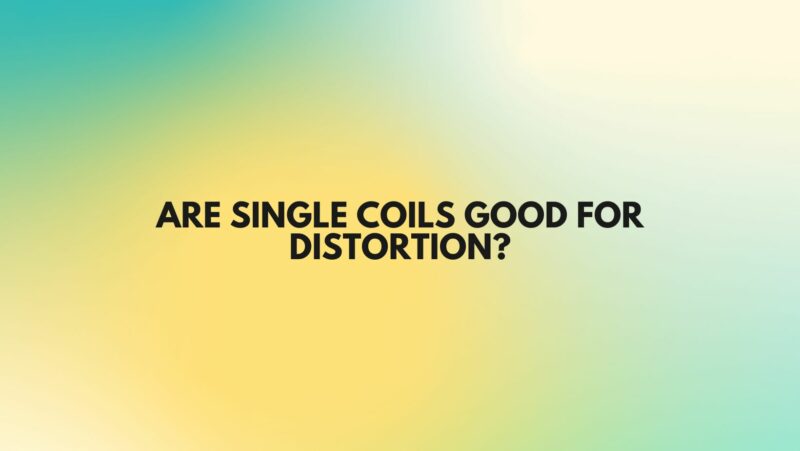The debate over single-coil pickups and their suitability for distortion has raged on for decades in the world of electric guitars. Single-coil pickups, known for their clarity, brightness, and vintage charm, have traditionally been associated with clean tones and twangy genres like blues, country, and surf rock. On the other hand, humbucking pickups have been favored for their ability to handle high-gain and distortion, making them the go-to choice for rock and metal players. But can single-coil pickups really handle distortion? In this comprehensive article, we’ll delve into the world of single-coil pickups, their unique characteristics, and how they can be used effectively in high-gain scenarios.
Understanding Single-Coil Pickups
Before we dive into the distortion debate, it’s essential to understand what single-coil pickups are and how they differ from humbuckers. Single-coil pickups consist of a single coil of wire wrapped around magnetic pole pieces. This design produces a bright, clear, and articulate tone with a sharp attack. Fender Stratocasters and Telecasters are famous for their single-coil pickups, and they have been a staple in genres like blues and classic rock.
The Distortion Dilemma
When it comes to achieving a heavily distorted sound, many guitarists have historically turned to humbucking pickups. Humbuckers, as the name suggests, “buck” the hum and interference inherent in single-coil pickups by using two coils wound in opposite directions. This design results in a thicker, higher-output sound with reduced noise, making it ideal for high-gain applications.
Single-Coil Distortion
While single-coil pickups may not be the first choice for metal or hard rock players seeking massive, saturated distortion, they are not without their merits in the world of overdrive and distortion. Here are some key points to consider:
- Clarity and Definition: Single-coil pickups excel at retaining clarity and definition even when distorted. This quality makes them suitable for styles like classic rock, blues-rock, and even funk, where note articulation and dynamics are essential.
- Dynamic Range: Single-coil pickups respond exceptionally well to your playing dynamics. Light pick attack results in a clean sound, while digging in produces a gritty, overdriven tone. This dynamic range can be a valuable asset when exploring the nuances of distortion.
- Unique Texture: The inherent brightness and sharp attack of single-coil pickups can add a unique texture to your distorted tones. This can cut through a mix and provide a distinct character that humbuckers may lack.
- Coil Splitting: Many guitars with humbuckers offer coil-splitting options, which effectively turn them into single-coil pickups. This feature allows you to enjoy the best of both worlds, switching between single-coil clarity and humbucker power.
- Pedal and Amp Tweaks: Achieving a great distorted sound with single-coil pickups often involves some pedal and amp adjustments. Experimenting with EQ settings, gain stages, and using overdrive pedals designed for single-coils can help you find your desired tone.
- Noiseless Single-Coils: Some manufacturers have developed noiseless single-coil pickups that aim to eliminate the hum associated with traditional single-coils. These pickups offer the clarity of single-coils without the noise issues.
Notable Examples
Several guitarists have made single-coil pickups work for them in high-gain settings:
- Jimi Hendrix: The legendary guitarist often used single-coil-equipped Fender Stratocasters to achieve his iconic distorted tones. His ability to control feedback and use the Strat’s bright, dynamic character to his advantage is a testament to the versatility of single-coils.
- Ritchie Blackmore: Another Stratocaster enthusiast, Blackmore used single-coil pickups with Deep Purple and Rainbow to craft his signature high-gain sounds. His playing showcased the sharp attack and clarity of single-coils even in heavy rock contexts.
Conclusion
In the debate over whether single-coil pickups are good for distortion, the answer is not a simple “yes” or “no.” It depends on the context, the player’s style, and personal preferences. Single-coil pickups offer a unique tonal palette, characterized by clarity, definition, and dynamic responsiveness. While they may not be the top choice for extreme metal tones, they can be incredibly versatile and effective in achieving a wide range of distorted sounds, from classic rock crunch to bluesy overdrive. With the right gear and techniques, single-coil pickups can be a valuable addition to any guitarist’s arsenal, providing a sonic edge that sets them apart in a sea of humbuckers and high-gain amplifiers. Ultimately, the choice between single-coil and humbucker pickups for distortion comes down to individual taste and the sonic vision of the player.


